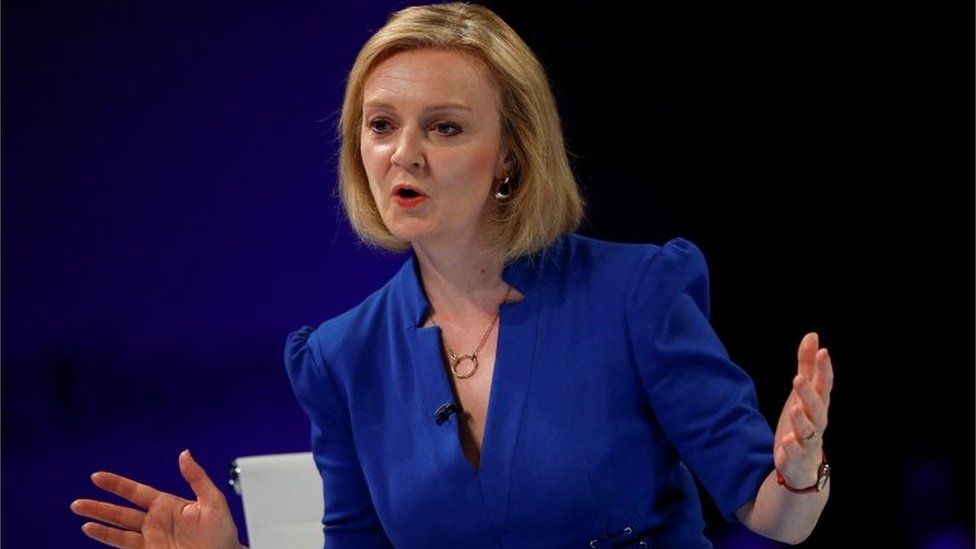But Labour and some Tories say her plan would mean pay cuts for those living outside London.
 Image source, Reuters
Image source, ReutersLiz Truss has said she wants to save taxpayers’ money by ending national pay deals for civil servants’ pay.
The Tory leadership candidate wants to link civil servants’ salaries to living standards where they work, meaning similar jobs could have different salaries depending on location.
Ms Truss says the scheme could be rolled out to other public sector areas, saving £8.8bn a year.
Labour called her plan “a fantasy recipe for levelling down”.
The party’s deputy leader Angela Rayner said it would reduce “the pay of Northerners, worsening the divide which already exists”.
Some Conservative MPs in the south west of England have also come out strongly against the proposals, with Steve Double, a Rishi Sunak ally, saying it would be “hugely damaging to public services in Cornwall”.
And Ben Houchen – mayor of Tees Valley and another supporter of Mr Sunak – said: “There is simply no way you can do this without a massive pay cut for 5.5 million people including nurses, police officers and our armed forces outside London.”
The Truss camp has argued that introducing regional pay would stop the public sector crowding out the private sector in places where private businesses can’t compete with public sector pay.
Ms Truss has also proposed scrapping jobs aimed at increasing inclusion and diversity in the public sector.
Alex Thomas of the Institute for Government think tank said the idea of regional pay “comes around every few years”.
“The reason why chancellors and prime ministers have previously tended to abandon it is the benefits are pretty marginal – both in terms of the cost you can save and the benefits to the local economy.”
Ms Truss has also been criticised for describing Scotland’s First Minister Nicola Sturgeon as an “attention-seeker”.
Scotland’s deputy first minister John Swinney said he was “absolutely horrified” and described the comments as “obnoxious”.
Ms Truss is competing with former Chancellor Mr Sunak to become the next Conservative leader, and prime minister.
The party’s 160,000 or so members are voting on which of the two they want to replace Boris Johnson, and the winner will be announced on 5 September.


There are bits of tinkering here and there in Ms Truss’s plans, like saving £12m a year from cutting civil service diversity officers.
But the only way these plans will save “billions” is if they not only pay civil servants less in poorer areas – but other public sector workers too.
Ms Truss says she’ll only do this if it “works” when they introduce it for civil servants.
Economically, the argument is that it’s harder for private companies to hire people where public pay is higher and harder to compete with.
But politically – it’s very hard to see how she sells this.
To save billions, she’s arguing you’d need a situation where nurses, police, teachers – for example – would be paid less in Sunderland than ones in Surrey.
Lots of policy has been pumped out in this campaign with headlines like ‘Whitehall waste’ to appeal to members.
But dig in to the detail, and there are loads of questions about how some of these would work in practice.

At a question session on Monday evening, Mr Sunak told party members he was the candidate for change.
He was introduced to the stage in Exeter by former International Trade Secretary Liam Fox who said Mr Sunak had the “character, courage, experience intellect and downright decency” to win over swing voters.
Ms Truss received her own campaign boost when she received the endorsement of trade minister Penny Mordaunt.
Ms Mordaunt – who was knocked out of the race after finishing third in the polling among MPs – described Ms Truss as the “hope candidate”.
Tax policy has become the main battleground in the contest, while both candidates have announced a string of competing policy proposals to woo Conservative members.
In addition to introducing regional pay, Ms Truss has said she would save £137m by banning union representatives from getting paid time off to focus on union work.
The foreign secretary also wants to reduce average civil service annual leave from 27 days to 25 and scrap Whitehall’s diversity officers – something her team estimates could save £12m a year.
Along with the proposed reforms to public sector pay, she says the total savings to the taxpayer would be up to £11bn.
The FDA – the union for senior civil servants – said it was “astounding” Ms Truss was planning to move jobs out of London while at the same time cutting regional pay.